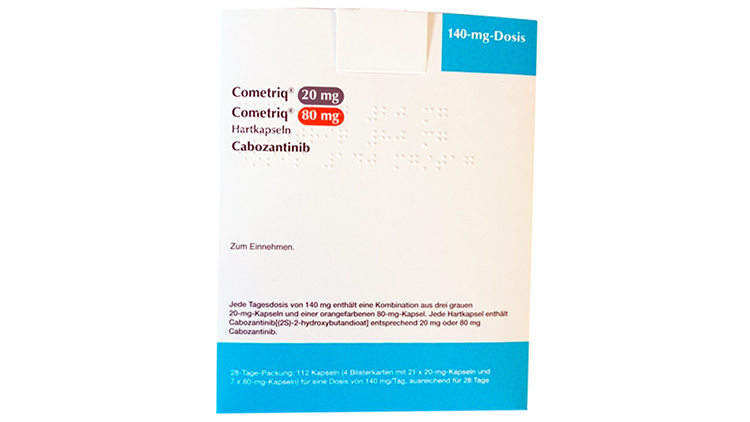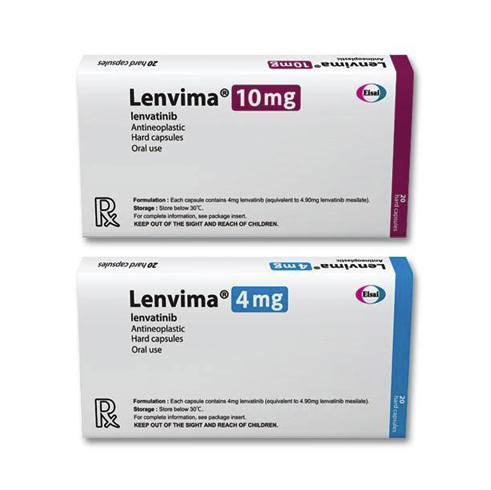Cometriq (cabozantinib) vs Lenvima (lenvatinib)
Cometriq (cabozantinib) vs Lenvima (lenvatinib)
Cometriq (cabozantinib) and Lenvima (lenvatinib) are both oral tyrosine kinase inhibitors used in the treatment of certain types of cancer, but they target different tyrosine kinases and have varying FDA approvals for specific cancer indications. Cometriq is primarily approved for the treatment of medullary thyroid cancer and has also been approved for advanced renal cell carcinoma and hepatocellular carcinoma, whereas Lenvima is approved for differentiated thyroid cancer, renal cell carcinoma in combination with everolimus, and for hepatocellular carcinoma. The choice between Cometriq and Lenvima would depend on the specific type of cancer being treated, the patient's overall health, the side effect profile of each medication, and the recommendation of the oncologist based on clinical guidelines and individual patient needs.
Difference between Cometriq and Lenvima
| Metric | Cometriq (cabozantinib) | Lenvima (lenvatinib) |
|---|---|---|
| Generic name | Cabozantinib | Lenvatinib |
| Indications | Medullary thyroid cancer, advanced renal cell carcinoma, previously treated hepatocellular carcinoma | Thyroid cancer, renal cell carcinoma, hepatocellular carcinoma, endometrial carcinoma |
| Mechanism of action | Tyrosine kinase inhibitor that targets MET, VEGFR, and AXL | Tyrosine kinase inhibitor that targets VEGFR, FGFR, PDGFR, RET, and KIT |
| Brand names | Cometriq, Cabometyx | Lenvima |
| Administrative route | Oral | Oral |
| Side effects | Diarrhea, weight loss, nausea, fatigue, hypertension, etc. | Hypertension, fatigue, diarrhea, decreased appetite, weight loss, etc. |
| Contraindications | Hypersensitivity to cabozantinib or any component of the formulation | Hypersensitivity to lenvatinib or any component of the formulation |
| Drug class | Tyrosine kinase inhibitor | Tyrosine kinase inhibitor |
| Manufacturer | Exelixis, Inc. | Eisai Inc. |
Efficacy
Cometriq (Cabozantinib) Efficacy in Thyroid Cancer
Cometriq, known by its generic name cabozantinib, is a medication that has shown efficacy in the treatment of medullary thyroid cancer (MTC). It is specifically indicated for patients with progressive, metastatic MTC. Cabozantinib is a tyrosine kinase inhibitor that targets multiple receptors, including RET, MET, and VEGFRs, which are involved in the pathogenesis of thyroid cancer. Clinical trials have demonstrated that Cometriq can significantly prolong progression-free survival in patients with metastatic MTC compared to placebo. This improvement in progression-free survival indicates that Cometriq is effective in slowing down the progression of the disease, which is a critical aspect for patients with this type of thyroid cancer.
Lenvima (Lenvatinib) Efficacy in Thyroid Cancer
Lenvima, or lenvatinib, is another tyrosine kinase inhibitor that has been approved for the treatment of differentiated thyroid cancer (DTC) following radioactive iodine (RAI) therapy in patients who are refractory to RAI. Lenvatinib targets various pathways that contribute to thyroid cancer progression, including VEGFR, FGFR, RET, KIT, and PDGFR. In clinical studies, Lenvima has shown a significant increase in progression-free survival in patients with RAI-refractory DTC. The efficacy of Lenvima in improving progression-free survival underscores its role as an important treatment option for patients with advanced thyroid cancer that is unresponsive to traditional therapies.
Comparative Efficacy in Thyroid Cancer Treatment
While both Cometriq and Lenvima are effective in treating certain types of thyroid cancer, their indications and mechanisms of action differ. Cometriq is primarily used for medullary thyroid cancer, whereas Lenvima is used for differentiated thyroid cancer that is refractory to radioactive iodine therapy. The efficacy of both medications in improving progression-free survival highlights their importance in the management of advanced thyroid cancers. However, the choice between these two medications would depend on the specific type of thyroid cancer, the patient's clinical profile, and the presence of mutations in certain genes that may influence the response to these drugs.
Conclusion
In conclusion, both Cometriq (cabozantinib) and Lenvima (lenvatinib) have shown efficacy in the treatment of different types of thyroid cancer. Their ability to target multiple pathways involved in cancer progression makes them valuable options for patients with advanced disease. Ongoing research and clinical trials continue to refine the understanding of how best to use these medications, including potential combinations with other therapies, to improve outcomes for patients with thyroid cancer.
Regulatory Agency Approvals
Cometriq
-
European Medical Agency (EMA), European Union

-
Food and Drug Administration (FDA), USA

Lenvima
-
European Medical Agency (EMA), European Union

-
Food and Drug Administration (FDA), USA

-
Health Canada

-
Pharmaceuticals and Medical Devices Agency (PMDA), Japan

-
Therapeutic Goods Administration (TGA), Australia

Access Cometriq or Lenvima today
If Cometriq or Lenvima are not approved or available in your country (e.g. due to supply issues), you can access them via Everyone.org.
How it works

Make an enquiry
Choose the medicine you want to buy, answer a couple of questions, and upload your prescription to speed things up. We’ll get back to you within 24 hours.


Make an enquiry
Choose the medicine you want to buy, answer a couple of questions, and upload your prescription to speed things up. We’ll get back to you within 24 hours.


Breeze through the paperwork
We'll guide you through the required documents for importing unapproved medicine, ensuring you have all the necessary information.


Get a personalized quote
We’ll prepare a quote for you, including medicine costs and any shipping, administrative, or import fees that may apply.


Receive your medicine
Accept the quote and we’ll handle the rest - sourcing and safely delivering your medicine.

Some text on this page has been automatically generated. Speak to your physician before you start a new treatment or medication.
Let's talk
If you have any questions, call us or send us a message through WhatsApp or email:
Contact us




